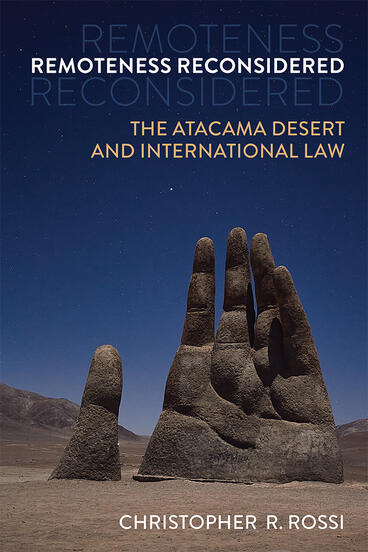Remoteness Reconsidered
The Atacama Desert and International Law
When the margin IS the center, perspectives shift
Description
Much of our understanding of the world is framed from the perspective of a dominant power center, or from standard readings of historical events. The architecture of international information distribution, academic centers, and the lingua franca of international scholarly discourse also shape these stories. Remoteness Reconsidered employs the idea of remoteness as an analytical tool for viewing international law's encounter with the Americas from the unusual, peripheral perspective of the Atacama Desert. The Atacama is one of the most remote places on Earth, although that less-than-accurate perspective comes from standard historical accounts of the region, accounts that originate from the “center.” Changing the usual frame of reference leads to a reconsideration of the idea of remoteness and of the subsequent marginalization of historical narratives that influence hemispheric international relations in important ways today. Lessons about international law's encounters with neoliberalism, indigenous and human rights, and the management and extraction of mineral resources take on new significance by following a spatial turn toward the idea of remoteness as applied to the Atacama Desert.
Christopher R. Rossi is Associate Professor of Political Science at UiT, The Arctic University of Norway, and an Associate Member of the Aurora Center at the Norwegian Center for the Law of the Sea.
Reviews
“A remarkably insightful interdisciplinary study interpreting how a remote region like the Atacama Desert becomes part of the global economy, and showcasing the role that International Law plays—and will continue to play—in that process.”
- Richard Francaviglia
—Richard Francaviglia, author of Imagining the Atacama Desert: A Five-Hundred-Year Journey of Discovery (2018) and The Enchantress of Atacama (2019)
“Remoteness Reconsidered is an eye-opening contribution to the spatial history of international law. Christopher Rossi has shown how the importance of the Atacama Desert has been neglected from colonial cartography to contemporary neoliberal policies, revealing why dominant views of remoteness merit to be revised by international lawyers and IR scholars.”
- Juan Pablo Scarfi
—Juan Pablo Scarfi, University of San Andres, author of The Hidden History of International Law in the Americas: Empire and Legal Networks (2017)
“A spatial, critical-geographic perspective on international law and its operation…Using the trope of ‘remoteness,’ Rossi offers both an original conceptual interrogation as well as a critical topography of one particular place—the Atacama Desert.”
- Petra Gümplová, Universität Erfurt
—Petra Gümplová, Universität Erfurt
“Rossi integrates multiple disciplines in the examination of [remoteness's] centrality in transboundary disputes and conflicts, using the Atacama as the trope.”
- Rhett Larson
—Rhett Larson, Arizona State University

